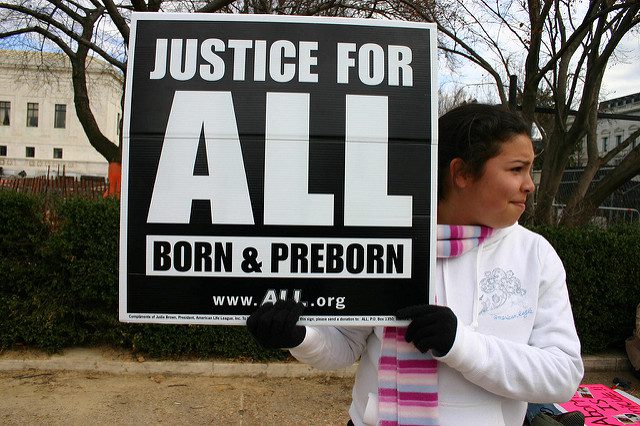
Sarah Babbs is a fellow writer at Patheos. She wrote an article entitled, “Pro-Life: Have You Earned It?”, which is largely a critique of what is called the “old” pro-life movement. As a proud member of that group since 1982, I thought I would highlight that our agreements are far greater and significant than any differences. I can only speak for myself, but I don’t regard myself as an atypical “old” pro-lifer. What I will express is what I understand to be standard, “mainstream” belief among this social group. Sarah’s words will be in blue.
***
The discussions surrounding what the term “pro-life” means seem to have ramped up as of late. Is it merely opposition to abortion? Is it opposition to abortion and a host of other violations of human life and dignity? Is it a fundamentally negative or positive definition?
Short answers: no, yes, and “positive.” Literally speaking, it is in favor of life rather than death as any sort of solution to anything. “The culture of life” . . . For a Catholic, this would include all life: preborn, born, young, old, whatever . . . all human life is sacred. On the other hand, “pro-life” is not improper as a description of “anti-abortion” belief. I think it’s a matter of both/and, and not either/or. It can have a broad meaning and also a more restricted one. It was the proponents of abortion who insisted on calling us “anti-abortion” (which is fine with me, as far as it goes. I am against abortion). But then that put us into a perceived “negative” box of merely being against something (a thing they falsely regarded as a “right”). Therefore, wishing to be “positive” we called ourselves “pro-life.”
Or should the meaning of pro-life encompass a more positive definition, stating the things which people ought to be for – as a matter of justice which is “being in right relationship”? Those two ideas are not mutually exclusive, yet so many act as though they are.
I agree. Both/and.
Organizations and collectives like the New Pro-Life Movement seek to expand the definition beyond merely opposing abortion to incorporate other actions, policies and structures which obstruct human life and its flourishing. I like to think of this broader understanding of what it means to be “pro-life” to be a whole life, human flourishing ethic.
That’s fine with me. I would only note that it’s also perfectly proper and right for different people to concentrate on different areas of the pro-life cause, while not denigrating any others.
[O]ld-guard pro-lifers tend to believe that abortion is an isolated social issue that is not impacted by other factors worthy of action (such as racism, poverty, etc.) and that one need not support social programs or other programs of social uplift to be pro-life.
One must make crucial distinctions here. All Catholics must be concerned about all aspects of Catholic social teaching; i.e., they must accept all of that as important, whether or not they are personally involved in every aspect of Catholic teaching or not (practically speaking, no one can be involved in every aspect of it). This remains true, whatever the actual and precise causal relation of other social issues is to abortion itself. And that is the unifying factor. If any Catholic says that any aspect of Catholic social teaching is optional or irrelevant, they are wrong, and dissenting against Church teaching.
That said, there can be legitimate, honest differences of opinion on particulars. Some “new” pro-lifers might argue, for example, that electing Democrats on the national level fosters a more pro-life environment, because their greater concern for other social issues besides abortion (despite their overwhelming — now almost unanimous — support for legal abortion) leads to less abortion. I strongly reject that (as seen, for example, in my article, “Do Democratic Presidents Cause Fewer Abortions to Occur?”).
But I don’t see that this is a fundamental difference between “old and “new” pro-lifers, since it has to do mostly with tactics and strategy: how to better bring about the thing we all agree on: less abortion and less need for abortion. We’re all fighting for the same end result, and all healthy social movements have internal disagreements, because thinking people have sometimes conflicting ideas.
Nothing happens in a vacuum. Take your Plato hat off for a moment and stop thinking about everything in terms of duality. There are zero choices that human beings make that aren’t directly impacted by multiple aspects of their embodied human experience.
I couldn’t agree more. I majored in sociology, and as a result, have always held that the causes of things are invariably multitudinous and complex. I would distinguish between (while accepting both as valid), seeking to lessen abortion now (through legal means in the short term) and seeking to create a pro-life environment: a much more long-term goal. The latter also is necessarily a spiritual matter. Thus, I have contended that, ultimately, only a spiritual revival will end legal abortion. That is a very “non-vacuum” outlook, and I think it is largely the same as what “new” pro-lifers are expressing. Were not as far apart as is imagined. I think if we took a poll of “old” pro-lifers and asked them whether they thought a spiritual revival wold be necessary to end abortion, probably at least 90% would agree.
This is precisely why things like racism and poverty are evil. They are evil because they disrespect and degrade the embodied human experience of someone wearing God’s face. To act as though choices made by those impacted by these things can never be evaluated through the lenses of race, class, and socioeconomic status is to deliberately put ones (privileged) head in the sand.
I agree again. The only difference of opinion here would be regarding the level or degree such things affect the choice to have an abortion. And there is more than one perspective in viewing any given situation. Jesse Jackson used to talk about how abortion was a form of genocide against African-Americans (who continue to be disproportionately killed in abortion). For some reason he chose to stop talking about it (and to favor legal abortion: quite a sea-change indeed!).
I still think it is a true and great insight, that incorporated the African-American experience into an analysis of what is occurring in our society with abortion. I remain very concerned about preborn black children being slaughtered in horrendous numbers (which has caused the percentage of the American population that is African-American to stagnate), but Jesse Jackson seems not to be. So who cares more about both preborn and born black kids? Who is more “holistic”? Is it the black Democrat social activist or the socially conscious white Catholic conservative (me)?
If someone is opposed to abortion, they are anti-abortion. They can freely take that descriptor on to themselves and proclaim it all day long. However, the title “pro-life” is not a descriptor we give ourselves. It is not taken – it is earned. We earn the label of pro-life through our action on behalf of life and the dignity of all humanity. Simply being anti-abortion does not make someone pro-life. That must be earned.
I agree that it should be earned, but I don’t see that two different meanings of one title are mutually exclusive. Almost all words have multiple meanings (any dictionary will quickly support that). I agree that we should be consistent in applying our Catholic beliefs regarding the sacredness of all life, at all stages of development.
This is analogous to the title of “ally” in anti-racism work. White people do not get to call themselves allies. The term ally is earned by white people through consistent action on behalf of people of color. Being an “ally” is a sign of working in solidarity with people of color and leveraging one’s own privilege as a white person to amplify and uplift the voices of people of color.
Yes, I’m an ally. I’ve always opposed racism. I grew up in Detroit; went to a high school (Cass Technical) that was 80% black and a college (Wayne State) that had about 1/4 black students (very high). Being against racism and for African-Americans is not an exclusive characteristic of liberals or Democrats. In fact, with regard to the famous Civil Rights Act of 1964 (which Democrats always claim as their “own”), it’s worthwhile to note that the percentage of Republicans voting in favor ranged from 80-82% in both Houses of Congress, while Democrats favoring it ranged from 61-69%. Southern Democrats were 93% opposed in the House (only seven voting for it) and 95% opposed in the Senate (only one vote in favor). Robert Byrd of West Virginia, former KKK and later the Democrat Senate Majority leader, voted against it.
This makes total sense, since the Democrat Party was the party of slavery, Jim Crow, and segregation. The Republicans began as an anti-slavery party, and it’s first candidate was Abraham Lincoln. Therefore, it is “nonsense” both historically and currently to act as if Republicans are the standard-bearers of racism.
Similarly, being “pro-life” is to act on behalf of all human beings to amplify and uplift the voices of those who are invisible and marginalized.
Agreed, though with the slight disclaimers that I have already detailed.
You are only as “pro-life” as the last thing you have done to uphold and promote human life and flourishing.
Your “precious feet” pin is only as relevant as your work to make this planet a safe place for those precious feet to land.
We must be consistently pro-life. Different folks can do different work within the overall movement (which incorporates both “new” and “old” and different political perspectives).
Talking about how terrible, misguided and evil pro-choice folks and Planned Parenthood are without turning a critical eye to the terrible influences alive and well in the pro-life movement is no longer an acceptable strategy or argument for anything.
Certainly we can’t cease talking about the evil perpetrated by Planned Parenthood and groups like it. It’s what we are opposing. Though Sarah seems to be primarily opposing hypocrisy here, her language also seems to suggest that we can;t speak out against evil. Yes, we should: about the evil of abortion and also about shortcomings, flaws, and sins within the pro-life movement. Both/and.
Don’t talk to me about Margaret Sanger’s eugenics. You think people in the pro-life movement today who see no need to call out or work against systemic racism or protest the injustice of police brutality against people of color aren’t eugenicists too?
I will (and do) talk about the evils of racism and eugenics wherever they occur.
Don’t tell me how bad “the other side” is, tell me what you are doing to be less terrible? What seeds of racism, sexism, and violence are you willing to do the brutal work of rooting from your soul.
Of course it is of the utmost importance for all of us to examine ourselves, lest we fall into the habit of seeing the speck in another’s eye and not the plank in our own.
Call that pro-life work and dedicate your own precious life to doing it.
I do and I have.
***
In conclusion, I think my answers above demonstrate that there is a great deal in common among “old” and “new” pro-lifers. I think we can and ought to work together. We should talk to (not just about) each other, and learn to mutually respect our differing emphases and concerns within the overall movement: all working towards the same goal. We’ll never move forward if we don’t talk to each other and only criticize each other (and/or stick to hanging around our own echo chambers, where everyone is exactly like we are). I’m here anytime a “new” pro-lifer wants to dialogue and work together for our same ultimate goal.
I disagree with some (non-fundamental) aspects of the New Pro-Life Movement. They disagree with some of my emphases and goals and ways of expressing and doing things. That means both sides are actively thinking through issues (it would be concerning if they weren’t). I have great respect for anyone in (any part of) the one pro-life movement: folks who truly care about the issue, and about all human persons. I don’t question anyone’s sincerity or commitment at all. We must dialogue and encourage mutual respect and understanding. We must work together.
I’m always here and willing to do that.
I thank Sarah for providing much food for thought.
**
[Note: if anyone wishes to learn more about my views on Catholic social teaching and social justice in general, see: “This ‘Conservative’ is Very Passionate About Social Justice”]
***
Photo credit: photograph by Elvert Barnes, at the 33rd March for Life in Washington, D.C. (1-23-06) [Flickr / CC BY 2.0 license]
***













